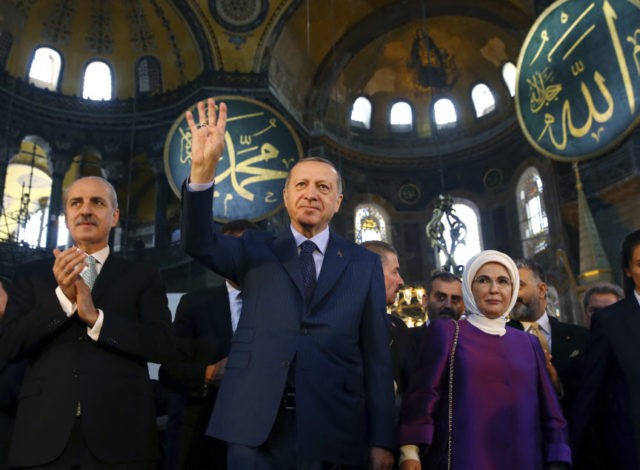Turkish President Recep Tayyip Erdogan declared on Friday that “resurrecting” a mosque inside the legendary Hagia Sophia cathedral is just the first step in a mission to “liberate the al-Aqsa mosque” – in other words, to eject the Jews from the holy site in Jerusalem they know as the Temple Mount.
The Hagia Sophia was constructed as a cathedral in the city of Constantinople during the Byzantine Empire but converted into a mosque – with architectural modifications such as the addition of Islamic minarets – after the Ottomans conquered the city in 1453 and renamed it Istanbul, the name it is known by today. In 1934, as part of Turkey’s campaign of modernization and secularization under Mustafa Kemal Atatürk, the Hagia Sophia became a museum and was later named as a World Heritage Site by the United Nations.
Erdogan’s determined effort to re-Islamicize Turkey and position himself as an aggressive champion of the Muslim faith put the Hagia Sophia in danger from the moment he assumed power. His government began allowing Muslim prayer services within the Hagia Sophia in 2015, and Erdogan personally led one in 2018, dedicating it to Mehmed the Conqueror, whose notable conquests included seizing Constantinople and bringing the Byzantine Empire down.
On Friday, Turkey’s high court ruled the 1934 edict that converted the Hagia Sophia into a museum was unconstitutional, and since the court did not also rule that Mehmed the Conqueror’s sacking of Constantinople was unlawful – on the contrary, it endorsed the ancient warrior-king and a foundation he established as the rightful owners of the property – the wondrous cathedral reverted to becoming a mosque.
Little time was wasted on putting the Hagia Sophia to use as a mosque. On Saturday, one day after the court decision, the Muslim call to prayer was recited in the minarets around the Hagia Sophia for the first time in 85 years.
Strong objections have been raised by the United Nations, the European Union, Greece, Pope Francis, and Orthodox Christians who regard the Hagia Sophia as one of their holiest sites, but Erdogan was undeterred. He announced that the reconquest of the Hagia Sophia was just the first step in a crusade that would soon reach Jerusalem.
The Jerusalem Post noted that Erdogan delivered his Friday address to the nation in Turkish. It was then “translated slightly differently to Arabic and English, apparently as a way to hide part of Ankara’s full views on how it has linked Hagia Sophia to a wider agenda.”
The Arabic version was a good deal spicier than the remarks passed along to English-speaking audiences. Erdogan said the “resurrection of Hagia Sophia follows the express will of Muslims throughout the world” and said he has only begun to implement the will of worldwide Islam:
In Arabic the speech says that turning Hagia Sophia into a mosque is part of the “return of freedom to al-Aqsa,” essentially meaning Israel should be ejected from controlling Jerusalem’s Old City where al-Aqsa is located.
Turkey’s president linked the decision to reviving Islam from Bukhara in Uzbekistan to Andalusia in Spain. This terminology, linking al-Aqsa in Jerusalem to Hagia Sophia and Spain, is a kind of coded terminology for a wider religious agenda. In the Turkish translation the same reference to Spain does not appear to be included as in the Arabic.
Turkey’s current president has long championed the Palestinian cause and been an extreme critic of Israel, famously walking off the stage at Davos during a discussion with former president Shimon Peres in 2009. Turkey then sent the Gaza flotilla to try to breach Israel’s blockade of Gaza, leading to the deaths of 10 Turkish citizens when Israeli forces raided the Mavi Marmara ship.
In recent years Turkey’s religious and political authorities have been making increasingly adversarial statements about Israel, vowing to mobilize the “Islamic ummah” in June against Israel’s annexation plans.
This is not the first time Erdogan has expressed support for militant Palestinians or spoken about the Temple Mount. In May, he described the al-Aqsa mosque as “a red line for all Muslims in the world” in a video address to American Muslims at the end of the Ramadan holiday season.
Erdogan boasted that the Hagia Sophia will remain accessible to everyone now that it has become a mosque – perhaps even more accessible because admission fees will be waived now that the site is no longer a museum. He added some jibes about how Muslim historical sites are supposedly abused by the Western world and argued that if the Hagia Sophia must remain a museum, then the Vatican should be classified as one too.
Erdogan’s linkage of the Hagia Sophia to the al-Aqsa mosque might be a pre-emptive response to the anticipated argument that if Turkey can ratify Mehmet’s conquest and turn one of the greatest cathedrals of Christendom into a mosque, there is no reason why mosques could not be converted into houses of worship for other religions.
Ibrahim Karagül, the most enthusiastically pro-Erdogan columnist at the enthusiastically pro-Erdogan newspaper Yeni Safak, found nothing defensive or allegorical about Erdogan’s comments on the Hagia Sophia.
Karagül applauded the Turkish president as the kind of “brave man” and “strong and determined leader” who can make history in a Monday editorial that sounded as if he was ready to help gas up the war wagons of the new Ottoman Empire and set out for Jerusalem immediately. He saw the reconquest of the ancient Byzantine cathedral as a huge morale boost for Muslims, a sign that history has reached a “breaking point,” the “end of Western hegemony” is at hand, and Turkey is once more an empire that “does not consist of Turkey or Anatolia alone.”
“So, what is going to happen next? What is in store? As we always say: This is only the beginning,” the Turkish columnist concluded.

COMMENTS
Please let us know if you're having issues with commenting.